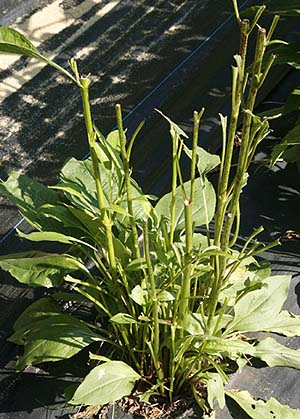Recently a friend forwarded me a link to a New York Times article talking about how botanists have just discovered that some plant grow better when they are pruned or eaten by animals. Apparently this was totally unknown to science before this and botanists thought that any damage to plants was detrimental.
I was incredulous!
Where have these so called botanists been hiding? In the greenhouse and the laboratory? Obviously not out in the field where the plants grow. Anyone who has spent time outside knows that many plants grow better when they have been eaten or pruned.
Hundreds of ‘how to’ articles are written about as many plants that include phrases like ‘pinch out the tops to create bushing’ or ‘cut plant down to ground to encourage strong growth’.
Botanists don’t think this is damage?

Photo. Whitney Cranshaw, Colorado State University, Bugwood.org
Anyone who has grown up in the countryside where there are grazing animals will have seen how many plants get stronger usually shorter and bushier when animals eat them. I grew up in rural England and I noticed this by the time I was six years old. Many plants, especially those you did not want like thistles grew stronger when the sheep and cows eat them. It was common knowledge everywhere. Now I live in the United States I see how many plants in our fields grow stronger and bushier after the deer have been through and eaten them off. Horseweed especially gets bushy and produces far more flowers than if left alone to grow tall and produce just one flower stalk. I just wish the deer would eat the plant to the ground rather than letting it grow into a bush. Top browsed plants are a lot stronger and much harder to pull out than the non eaten ones.
It is true that many plants don’t do well with browsing. These tend to be the ornamental plants that we bring home from the nursery. Ones that have been bred to have large flowers and no defenses. They are grown in our gardens which are not areas where they are native so they don’t know how to cope with the local herbivores.

For most people this is never a problem since they put there plants into suburban gardens and they bloom wonderfully enhancing the landscape and making the garden beautiful. These plants never see a predator (large plant eating animal) so these plants are soft. Put the same plants in a rural area where there are deer or rabbits and they will get eaten to the ground and most likely not recover. They are not used to it. Some will come back stronger but not that many. If this is where the botanists have been concentrating their knowledge then of course they will think that plants don’t like being eaten. But like all scientists they should get outside the laboratory and look at the real world. Any farmer who has livestock will tell you that a lot of plants grow strong and bushy if eaten. Most often they are not ones that the farmer wants but they still know about them. It’s something you just learn, it does not take a degree to figure out, I suspect, like me, they see it from a very young age and just accept it as part of the plants life.
Many plants we grow also fall into this category. Often people prune shrubs and certainly herbs to make them bush out and produce more bulk. This includes a lot of herb plants. Most people know that if they cut down their basil or parsley plant it will grow back up again. Cut many plants to the ground and they will come back stronger. It’s common garden knowledge.
So how come the botanists think they have just discovered something? I guess it would never occur to them just to ask any keen gardener or a farmer.
